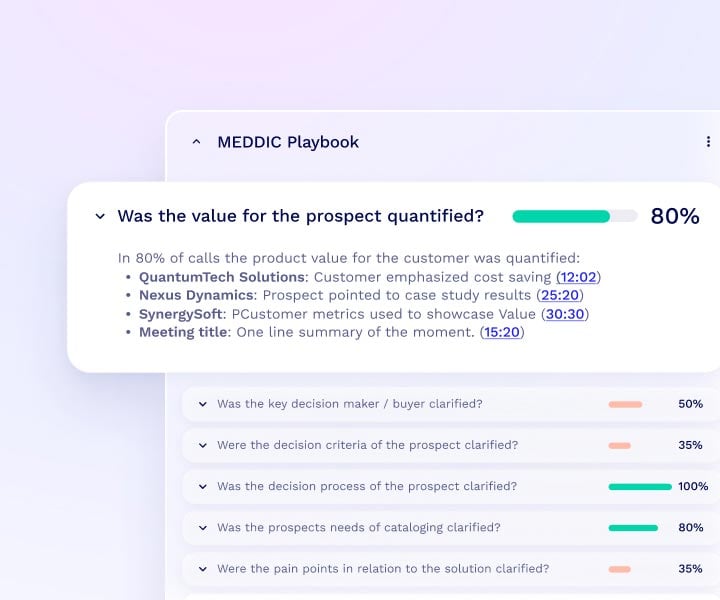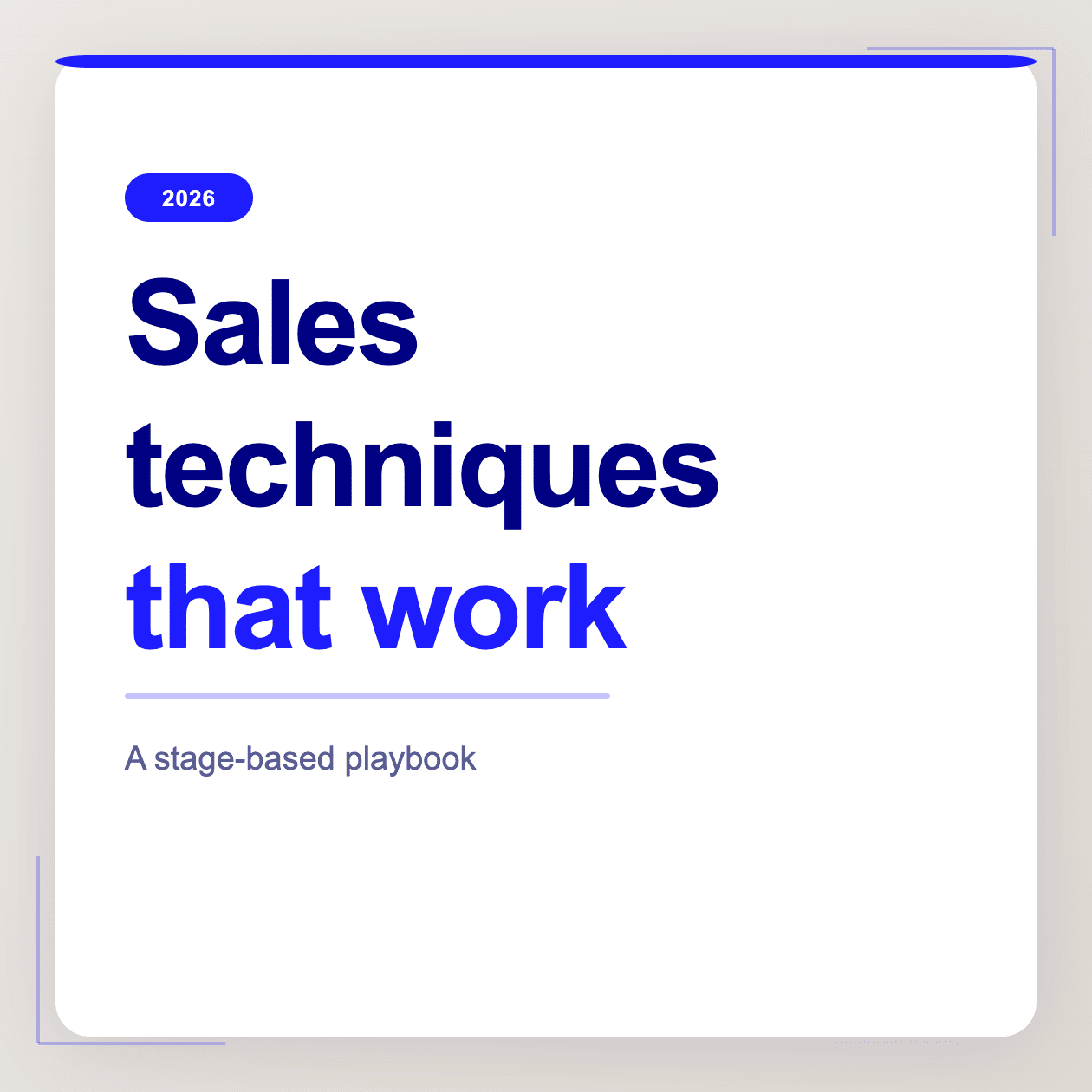Wir sind uns alle einig, dass der Einsatz von KI-Verkaufsagenten heute eher eine Selbstverständlichkeit als ein "Vielleicht" ist. Wer heute im Vertrieb erfolgreich sein will, muss die Kraft der Automatisierung, der KI und des intelligenten Verkaufs nutzen. Es ist zwar unwahrscheinlich, dass KI den Vertrieb vollständig übernehmen wird, aber ein Großteil der täglichen Aufgaben, der Verwaltung und sogar der Analyse kann von künstlicher Intelligenz übernommen werden.
Diese KI-gestützten Tools übernehmen verschiedene Aufgaben, von der Datenanalyse bis zum Lead-Management, und helfen den Vertriebsmitarbeitern, der Kundenbeziehung und der Strategie Vorrang vor sich wiederholenden administrativen Aufgaben zu geben. Ihre Rolle bei der Schaffung eines fokussierteren und reaktionsfähigeren Vertriebsprozesses ist unbestreitbar.
Überblick über AI-Verkaufsagenten
KI-Vertriebsagenten haben viele Formen angenommen, aber ihr Einsatz in Meetings ist besonders wirkungsvoll. KI-Besprechungsassistenten sind darauf ausgelegt, die Details von Vertriebsinteraktionen zu verwalten, einschließlich der Planung, der Erstellung von Notizen, der Zusammenfassung von Diskussionen und der Nachverfolgung von Aktionspunkten. Durch die Automatisierung dieser Aufgaben können sich Vertriebsteams darauf konzentrieren, die Kundenbedürfnisse zu verstehen und ihre Pitches effektiv zu gestalten.
KI-Agenten in Besprechungen und KI-Besprechungsassistenten sind nicht nur effizient, sondern bieten auch einen Mehrwert, indem sie verwertbare Erkenntnisse erfassen. Sie können Gespräche nach Mustern analysieren, die Stimmung der Kunden messen und Verbesserungsmöglichkeiten aufzeigen, sodass die Teams ihre Vorgehensweise präzise anpassen können. So wird sichergestellt, dass kein Detail übersehen wird und jede Interaktion zielgerichtet ist.
Doch wenn der Einsatz von KI-Agenten im Vertrieb nun zur Norm wird, wie sieht das aus und was müssen wir beachten?
Welche Arten von KI-Agenten für den Vertrieb gibt es?
KI-Agenten gibt es in verschiedenen Formen für den Vertrieb, die jeweils auf die Bewältigung bestimmter Aufgaben im Verkaufsprozess zugeschnitten sind. Diese Agenten bringen Effizienz, Einblicke und Automatisierung für Vertriebsteams, reduzieren die Arbeitslast und steigern die Ergebnisse.
- Meeting-Assistenten
- CRM-Agenten
- Chatbots
- Workflow-Automatisierungs-Agenten
- Verkaufsprognose-Agenten
Ein Beispiel dafür könnte sein, dass Sie sich als Vertriebsleiter auf eine arbeitsreiche Woche vorbereiten. Ihr Posteingang quillt über, und Sie haben eine Mischung aus Kundenterminen, Nachfassaktionen und Verwaltungsaufgaben. Hier kommen die KI-Agenten ins Spiel. Während Sie noch Ihren Morgenkaffee trinken, bestätigt Ihr Meeting-Assistent bereits Termine und bereitet Notizen aus früheren Gesprächen vor. Gleichzeitig tritt ein Chatbot auf Ihrer Website mit potenziellen Kunden in Kontakt und qualifiziert Leads, bevor Sie sich überhaupt einloggen. In der Zwischenzeit hat ein Prognose-Agent eine Delle in Ihrer Pipeline für den nächsten Monat festgestellt und schlägt Bereiche vor, denen Sie jetzt Priorität einräumen sollten. Dies gibt einen Vorgeschmack darauf, was eine Reihe von vertriebsorientierten KI-Agenten für Ihr Team leisten könnte. Nachfolgend finden Sie eine Aufschlüsselung der wichtigsten Typen und ihrer Funktionen:
1. Sitzungsassistenten
Was sie tun
KI-Meeting-Assistenten rationalisieren die Planung, Durchführung und Nachbereitung von Meetings. Sie kümmern sich um die Terminplanung, transkribieren Gespräche, fassen die wichtigsten Punkte zusammen und verfolgen Aktionspunkte.
Wie sie Vertriebsteams helfen
- Sparen Sie Zeit durch die Automatisierung von Verwaltungsaufgaben.
- Achten Sie darauf, dass keine wichtigen Details übersehen werden.
- Stimmungsanalyse in Echtzeit, um das Kundenengagement zu messen.
Beispiel für einen Anwendungsfall
Ein Besprechungsassistent plant ein Verkaufsgespräch, transkribiert das Gespräch und sendet eine Follow-up-E-Mail mit Aktionspunkten für beide Parteien.
Beispiel-Tool
tl;dv: Zeichnet Videoanrufe auf und transkribiert sie, fasst die wichtigsten Punkte zusammen und lässt sich direkt in CRM-Systeme integrieren.
2. CRM-Agenten
Was sie tun
CRM-Agenten (Customer Relationship Management) automatisieren und verbessern die Verwaltung von Kundendaten und -interaktionen innerhalb einer CRM-Plattform.
Wie sie Vertriebsteams helfen
- Aktualisieren Sie Kundendatensätze automatisch nach Anrufen oder Besprechungen.
- Verfolgen Sie Kundenaktivitäten und -präferenzen.
- Empfehlung der nächstbesten Maßnahmen auf der Grundlage historischer Daten.
Beispiel für einen Anwendungsfall
Ein CRM-Agent aktualisiert den Status eines Leads nach einer Demo und schlägt einen Folgetermin auf der Grundlage des Engagements des Leads vor.
Beispiel-Tool
HubSpot AI: Automatisiert die Dateneingabe, verfolgt die Customer Journeys und schlägt die nächsten Schritte vor.
3. Chatbots
Was sie tun
Chatbots interagieren mit Interessenten und Kunden in Echtzeit und geben sofortige Antworten auf Anfragen.
Wie sie Vertriebsteams helfen
- Erledigen Sie sich wiederholende Fragen, um den Vertriebsmitarbeitern mehr Zeit zu geben.
- Qualifizieren Sie Leads durch das Sammeln von Vorabinformationen.
- Leiten Sie Kunden bei Kaufentscheidungen.
Beispiel für einen Anwendungsfall
Ein Chatbot beantwortet die Fragen eines Kunden zur Preisgestaltung und sammelt seine E-Mail für ein Follow-up.
Beispiel-Tool
Drift: Bindet Website-Besucher ein, qualifiziert Leads und lässt sich in CRM-Systeme integrieren.
4. Agenten für die Workflow-Automatisierung
Was sie tun
Diese Agenten automatisieren sich wiederholende Prozesse, wie das Versenden von Erinnerungen oder das Aktualisieren von Datensätzen, in Vertriebsworkflows.
Wie sie Vertriebsteams helfen
- Eliminieren Sie manuelle Aufgaben.
- Gewährleistung der Kohärenz der Verkaufsaktivitäten.
- Verbesserung der allgemeinen Teameffizienz.
Beispiel für einen Anwendungsfall
Ein Workflow-Agent sendet vor einem geplanten Anruf eine automatische Erinnerung an einen Kunden.
Beispiel-Tool
Zapier: Verbindet Apps, um Workflows zu automatisieren, z. B. das Senden von Follow-up-E-Mails oder das Aktualisieren von CRM-Daten.
5. Absatzprognose-Agenten
Was sie tun
Agenten für Vertriebsprognosen analysieren Vertriebsdaten und automatisieren Arbeitsabläufe, damit sich die Teams auf die effektivsten Chancen konzentrieren können.
Wie sie Vertriebsteams helfen
- Geben Sie Einblicke in den Fortschritt des Geschäfts und schlagen Sie die nächsten Schritte vor, um den Schwung aufrechtzuerhalten.
- Aufzeigen von Risikogeschäften und Verbesserungsmöglichkeiten in der Pipeline.
- Automatisieren Sie Routineaufgaben und gewinnen Sie so Zeit für hochwertige Vertriebsaktivitäten.
Beispiel für einen Anwendungsfall
Ein Forecasting Agent empfiehlt Follow-up-Aktionen für Leads mit geringem Engagement und sorgt so für einen konsistenten Fortschritt durch den Verkaufstrichter.
Beispiel-Tool
Pipedrive AI CRM: Bietet personalisierte Geschäftseinblicke, identifiziert Leads mit hoher Priorität und automatisiert sich wiederholende Aufgaben, um die Effizienz und die Verkaufsergebnisse zu verbessern.
Multifunktionalität in AI-Tools
Einige Tools lassen die Grenzen zwischen diesen Kategorien verschwimmen. So unterstützt tl;dv nicht nur Meetings, sondern kann auch Notizen direkt mit einem CRM synchronisieren und Daten analysieren, um Abschlussquoten vorherzusagen. Bei der Auswahl eines KI-Agenten ist es wichtig, Tools in Betracht zu ziehen, die mehrere Aufgaben übernehmen können, so dass weniger separate Lösungen erforderlich sind und eine nahtlose Integration in Ihren Vertriebsprozess gewährleistet ist.

Was sind die Vorteile von KI-Agenten für den Vertrieb?
KI-Agenten bieten eine Vielzahl von Vorteilen für Vertriebsteams. Sie verbessern die Produktivität, die Effizienz und die Arbeitsmoral des Teams und steigern gleichzeitig das Kundenerlebnis. Hier erfahren Sie, wie sie auf breiter Front einen Mehrwert schaffen:
- Zeitersparnis für Vertriebsteams
- Verbesserte Datengenauigkeit
- Bessere Kundenerfahrung
- Skalierbarkeit
- Gesteigerte Team-Moral
- Schnelleres Time-to-Market
- Vereinfachte Ausbildung
- Umsetzbare Erkenntnisse für Manager
1. Zeitersparnis für Vertriebsteams
KI-Agenten übernehmen sich wiederholende, zeitaufwändige Aufgaben wie Terminplanung, Dateneingabe und Nachfassaktionen. So können sich Vertriebsmitarbeiter auf hochwertige Aktivitäten wie den Aufbau von Beziehungen und den Abschluss von Geschäften konzentrieren. Ein Meeting-Assistent kann beispielsweise die Logistik eines Anrufs übernehmen, das Gespräch transkribieren und nahtlos Folgeaktionen einrichten.
2. Verbesserte Genauigkeit
Manuelle Prozesse führen oft zu Fehlern, die Arbeitsabläufe stören oder das Vertrauen der Kunden beschädigen können. KI-Agenten stellen sicher, dass die Daten durchgängig korrekt sind, egal ob es um die Aktualisierung von CRM-Systemen, die Verfolgung von Leads oder die Verwaltung von Nachfassaktionen geht. Dies reduziert das Risiko von Fehlkommunikation und stellt sicher, dass nichts durch die Maschen fällt.
3. Bessere Kundenerfahrung
KI-gestützte Tools wie Chatbots sprechen potenzielle Kunden sofort an, beantworten ihre Fragen und führen sie durch den Kaufprozess. Dieses Maß an Reaktionsfähigkeit sorgt für eine reibungslosere und persönlichere Kundenerfahrung und erhöht die Zufriedenheit und Loyalität.
4. Skalierbarkeit
KI-Agenten passen sich sowohl an die Bedürfnisse kleiner als auch großer Teams an. Bei kleineren Teams füllen sie Ressourcenlücken und bewältigen hohe Arbeitslasten. In größeren Unternehmen sorgen sie für Konsistenz und Standardisierung über Abteilungen und Regionen hinweg und erleichtern so die Verwaltung komplexer Abläufe.
5. Verbesserte Moral des Teams
Durch die Entlastung von sich wiederholenden Verwaltungsaufgaben helfen KI-Agenten den Vertriebsmitarbeitern, sich konzentrierter und produktiver zu fühlen. Dies kann zu einer höheren Arbeitszufriedenheit, einem geringeren Burnout und einer niedrigeren Fluktuationsrate führen, was wiederum eine glücklichere und engagiertere Belegschaft schafft.
6. Schnelleres Time-to-Market
Dank der Geschwindigkeit und Präzision von KI-Agenten können Teams neue Vertriebsstrategien umsetzen oder Produkte effizienter einführen. Da weniger Zeit für administrative Aufgaben aufgewendet werden muss, können die Teams schnell reagieren, um neue Chancen zu nutzen.
7. Vereinfachte Ausbildung
KI-Agenten machen intensive Schulungen für sich wiederholende Aufgaben überflüssig, so dass sich die Manager auf die Entwicklung strategischer Fähigkeiten in ihren Teams konzentrieren können. Dies führt zu sachkundigeren und besser ausgebildeten Vertriebsmitarbeitern.
8. Umsetzbare Einsichten für Manager
KI-Tools bieten Managern Echtzeitdaten und Einblicke in die Teamleistung, den Zustand der Pipeline und das Kundenverhalten. Dies ermöglicht eine intelligentere Entscheidungsfindung und hilft, Verbesserungsmöglichkeiten zu erkennen.
Was sind die Herausforderungen von KI-Agenten für den Vertrieb?
Obwohl KI-Agenten den Vertriebsteams immense Vorteile bieten, ist ihre Einführung mit einer Reihe von Herausforderungen verbunden. Die Identifizierung und Bewältigung dieser potenziellen Hindernisse kann einen reibungsloseren Übergang und langfristigen Erfolg gewährleisten.
- Kosten der Erstimplementierung
- Integration in bestehende Systeme
- Bedenken hinsichtlich Datensicherheit und Datenschutz
- Widerstand von Vertriebsteams
- Steile Lernkurven
- Übermäßiges Vertrauen in KI
- Inkonsistente Datenqualität
- Risiken durch die Bindung an einen Anbieter
1. Kosten der Erstimplementierung
KI-Tools erfordern oft erhebliche Vorabinvestitionen, einschließlich Lizenzgebühren, Infrastruktur-Upgrades und Mitarbeiterschulungen. Für kleinere Teams oder Unternehmen mit knappen Budgets können diese Kosten ein Hindernis darstellen. Um dies abzumildern, konzentrieren Sie sich auf Tools mit skalierbaren Preisen und messen Sie den ROI der Effizienzgewinne im Laufe der Zeit.
2. Integration in bestehende Systeme
Die Integration von KI-Agenten in bestehende Arbeitsabläufe oder Tools wie CRM-Systeme kann eine technische Herausforderung sein. Eine mangelhafte Integration kann zu Ineffizienz und Frustration führen. Die Auswahl von KI-Tools mit nachgewiesener Kompatibilität und die Durchführung von Pilotprogrammen vor der vollständigen Einführung können helfen, Störungen zu vermeiden.
3. Bedenken hinsichtlich der Datensicherheit und des Datenschutzes
KI-Agenten verarbeiten große Mengen an Kundendaten, was die Sicherheit zu einem Hauptanliegen macht. Unternehmen müssen die Einhaltung von Vorschriften wie GDPR sicherstellen und Anbieter mit robusten Verschlüsselungs- und Datenschutzmaßnahmen auswählen. Klare interne Richtlinien und regelmäßige Audits sind ebenfalls wichtig, um Risiken zu minimieren.
4. Widerstand von Vertriebsteams
Einige Teammitglieder befürchten möglicherweise, ihren Arbeitsplatz zu verlieren oder fühlen sich durch neue Technologien bedroht. Dieser Widerstand kann die Einführung behindern. Betonen Sie, dass KI-Agenten die menschliche Arbeit nicht ersetzen, sondern ergänzen sollen, und zeigen Sie, wie sie Zeit für sinnvollere Aufgaben freisetzen.
5. Steile Lernkurven
Die Einführung von KI-Tools erfordert häufig, dass Teams neue Software und Arbeitsabläufe erlernen, was die Produktivität vorübergehend bremsen kann. Umfassende, fortlaufende Schulungen und Unterstützung können den Teams helfen, sich schnell und sicher anzupassen.
6. Übermäßige Abhängigkeit von KI
Wenn man sich zu sehr auf KI verlässt, kann das zu einem verminderten menschlichen Urteilsvermögen oder zu einem Mangel an persönlicher Note bei Kundeninteraktionen führen. Die Teams sollten ein Gleichgewicht zwischen Automatisierung und menschlicher Aufsicht herstellen, um sicherzustellen, dass die Beziehungen authentisch bleiben und die Strategien flexibel bleiben.
7. Inkonsistente Datenqualität
KI-Agenten sind auf hochwertige, genaue Daten angewiesen, um effektiv arbeiten zu können. Wenn bestehende Datensätze unvollständig oder inkonsistent sind, kann dies zu Fehlern oder verpassten Chancen führen. Eine Datenbereinigung vor der Implementierung stellt sicher, dass KI-Agenten wie vorgesehen funktionieren.
8. Lock-in-Risiken für Lieferanten
Die Entscheidung für eine proprietäre KI-Lösung kann zu einer Anbieterbindung führen, die die zukünftige Flexibilität einschränkt und die langfristigen Kosten erhöht. Um dies zu vermeiden, sollten Sie Tools mit offenen Integrationsoptionen den Vorzug geben und sicherstellen, dass Sie die Eigentümerschaft über Ihre Daten behalten.
Indem sie diese Herausforderungen erkennen und sie mit sorgfältiger Planung, klarer Kommunikation und strategischer Entscheidungsfindung angehen, können Vertriebsteams das Beste aus den KI-Agenten herausholen und gleichzeitig die üblichen Fallstricke vermeiden.
Was sind die wichtigsten Merkmale von KI-Vertriebsagenten?
KI-Verkaufsagenten sind mit einer Reihe von Funktionen ausgestattet, die Arbeitsabläufe rationalisieren, Kundeninteraktionen verbessern und den Verkaufserfolg steigern. Nachfolgend finden Sie die wichtigsten Funktionen, die Sie berücksichtigen sollten:
- Transkription und Notizen in Echtzeit
- CRM-Integrationen
- Prädiktive Analytik für Lead Scoring
- Sentiment-Analyse
- Automatisierung von Arbeitsabläufen
- Verwertbare Erkenntnisse und Berichte
- Anpassbare Arbeitsabläufe
1. Echtzeit-Transkription und -Anmerkung
KI-Besprechungsassistenten erfassen jedes Detail während Vertriebsbesprechungen und erstellen genaue Abschriften und Zusammenfassungen. Dies macht manuelle Notizen überflüssig und stellt sicher, dass keine kritischen Punkte und Aktionspunkte übersehen werden.
Beispiel: Ein Meeting-Assistent zeichnet eine virtuelle Verkaufsdemo auf, hebt die wichtigsten Kundenanliegen hervor und sendet die Zusammenfassung per E-Mail an alle Teilnehmer.
2. CRM-Integration
Die nahtlose Integration mit CRM-Plattformen sorgt dafür, dass die Kundendaten automatisch aktualisiert und synchronisiert werden. Dies minimiert die manuelle Dateneingabe, reduziert Fehler und hält die Datensätze für eine bessere Entscheidungsfindung aktuell.
Beispiel: Ein CRM-Agent protokolliert die Ergebnisse von Besprechungen, aktualisiert den Lead-Status und empfiehlt Folgemaßnahmen direkt in Tools wie Salesforce oder HubSpot.
3. Prädiktive Analytik für Lead Scoring
Anhand von historischen Daten und Verhaltensmustern bewerten KI-Agenten Leads auf der Grundlage ihrer Konvertierungswahrscheinlichkeit. Dies hilft den Vertriebsteams, ihre Bemühungen auf die vielversprechendsten Chancen zu konzentrieren.
Beispiel: Ein prädiktives Analysetool hebt die leistungsstärksten Leads auf der Grundlage von Website-Aktivitäten und E-Mail-Beteiligung hervor.
4. Stimmungsanalyse
Durch die Analyse von Tonfall und Engagement während der Kundeninteraktion geben KI-Agenten Einblicke in die Stimmung der Kunden. Auf diese Weise können Vertriebsmitarbeiter ihre Strategien anpassen und effektiv auf Bedenken eingehen.
Beispiel: Die Stimmungsanalyse zeigt an, dass ein Interessent während eines Gesprächs zögert, und hilft dem Vertriebsmitarbeiter bei der Anpassung der Folgekommunikation.
5. Automatisierung von Arbeitsabläufen
KI-Agenten rationalisieren sich wiederholende Aufgaben wie die Terminplanung, das Versenden von Erinnerungen oder die Verfolgung von Folgeterminen. Dies gewährleistet Konsistenz und schafft Zeit für hochwertige Aktivitäten.
Beispiel: Ein Tool zur Workflow-Automatisierung versendet Besprechungserinnerungen, protokolliert Aktionspunkte und plant Folgegespräche.
6. Verwertbare Einblicke und Berichte
KI-Agenten analysieren große Datensätze, um detaillierte Leistungsberichte, Pipeline-Trends und Einblicke in das Kundenverhalten zu liefern. Diese Erkenntnisse ermöglichen es Managern, fundierte Entscheidungen zu treffen und Strategien zu verfeinern.
Beispiel: Ein Reporting Agent identifiziert leistungsschwache Segmente im Verkaufstrichter, so dass Manager ihre Taktik anpassen können.
7. Anpassbare Arbeitsabläufe
Viele KI-Tools ermöglichen die Anpassung an spezifische Vertriebsprozesse. Diese Flexibilität stellt sicher, dass sich die Agenten an die Bedürfnisse Ihres Teams anpassen, anstatt starre Arbeitsabläufe zu erzwingen.
Beispiel: Ein Vertriebsteam passt ein KI-Tool an, um hochwertige Leads zu priorisieren und Nachfassaktionen innerhalb von zwei Tagen nach dem Erstkontakt zu planen.
Was sind einige Anwendungsfälle für KI-Agenten im Vertrieb?
Es ist zwar leicht zu glauben, dass Sie KI-Agenten einfach in Ihren Vertriebsprozess einbauen können, aber wahrscheinlich müssen Sie herausfinden, an welcher Stelle in Ihrem Vertriebszyklus und in Ihren Prozessen Sie den besten Return on Investment von KI-Agenten im Vertrieb sehen werden. Wir schlüsseln die verschiedenen Rollen und Anwendungsfälle auf, die ein KI-Agent im Vertriebsprozess eines Unternehmens bieten kann.
CRM-Agenten
KI-Agenten verändern die Art und Weise, wie Vertriebsteams mit CRM-Systemen interagieren, indem sie die Dateneingabe automatisieren und für sauberere und genauere Datensätze sorgen. Sie aktualisieren Kundendaten in Echtzeit, protokollieren Anrufergebnisse und verfolgen den Lead-Status ohne manuelle Eingaben, sodass sich die Vertriebsmitarbeiter auf den Aufbau von Beziehungen konzentrieren können.
Diese Agenten können auch CRM-Daten analysieren, um Trends zu erkennen und verwertbare Erkenntnisse zu liefern, z. B. welche Leads priorisiert werden sollen oder wann inaktive Kunden wieder angesprochen werden sollen. Durch tadellose CRM-Hygiene reduzieren KI-Agenten Fehler, optimieren Arbeitsabläufe und stellen sicher, dass Teams über zuverlässige Daten verfügen, um ihre Strategien zu steuern.
Verkaufstraining Agenten

KI-Agenten helfen dabei, die Lernkurve von Vertriebsmitarbeitern zu beschleunigen, indem sie personalisierte, dynamische Schulungsmodule erstellen. Durch die Analyse von Leistungsdaten und die Identifizierung von Lücken stellen diese Tools gezielte Ressourcen zur Verfügung, die auf bestimmte verbesserungsbedürftige Bereiche eingehen.
Ein KI-Schulungsagent könnte zum Beispiel feststellen, dass ein Vertreter Schwierigkeiten mit der Einwandbehandlung hat, und maßgeschneiderte Mikrokurse, Rollenspielszenarien oder Tipps zur Verbesserung vorschlagen. Auf diese Weise wird sichergestellt, dass das Training effizient und für jeden Einzelnen direkt relevant ist. Vertriebsleiter können diese Erkenntnisse nutzen, um den Fortschritt zu verfolgen, die Konsistenz bei der Entwicklung von Fähigkeiten sicherzustellen und ihre Coaching-Bemühungen auf die Bereiche zu konzentrieren, in denen sie am dringendsten benötigt werden. Ein Beispiel hierfür wäre, dass tl;dv auf der Grundlage der in mehreren Verkaufsgesprächen gesammelten Erkenntnisse maßgeschneidertes Verkaufsfeedback anbietet, dieses in das zentrale CRM einspeist und dann auf den einzelnen Verkäufer bezogenes Feedback gibt.
Inbound-Leads pflegen
KI-Agenten sind fantastisch bei der Qualifizierung und Pflege von eingehenden Leads und stellen sicher, dass potenzielle Kunden umgehend und effektiv angesprochen werden. Sie analysieren das Besucherverhalten, segmentieren Leads anhand vordefinierter Kriterien und interagieren über automatisierte E-Mail-Sequenzen oder Chatbot-Interaktionen.
Ein KI-Agent kann beispielsweise einen Lead identifizieren, der mehrere Ressourcen auf Ihrer Website herunterlädt, sein Interesse bewerten und eine Follow-up-E-Mail einleiten oder einen Anruf mit einem Vertreter vereinbaren. Durch die Automatisierung dieser Prozesse können Vertriebsteams die Reaktionszeiten verkürzen, die Lead-Konversionsraten verbessern und potenzielle Kunden für die menschliche Interaktion priorisieren.
Vertreter Onboarding-Agenten
KI-Agenten rationalisieren die Einarbeitung neuer Vertriebsmitarbeiter, indem sie maßgeschneiderte Einarbeitungspläne und Ressourcen bereitstellen. Sie können neue Mitarbeiter durch die Unternehmenssysteme führen, Tutorials zu Tools wie CRM anbieten und Antworten auf häufige Fragen geben.
Ein KI-Onboarding-Agent könnte beispielsweise eine Schritt-für-Schritt-Anleitung für die Erfassung von Leads präsentieren oder Best Practices für die E-Mail-Erreichbarkeit vorschlagen. Dieser praktische Ansatz verkürzt die Zeit, die neue Mitarbeiter benötigen, um produktiv zu werden, und sorgt dafür, dass sie sich während des Übergangs unterstützt fühlen. Manager können den Onboarding-Fortschritt über Echtzeit-Dashboards verfolgen und so eventuelle Lücken schnell beheben.
Partner-Onboarding-Agenten
KI-Agenten vereinfachen den oft komplexen Prozess des Onboardings neuer Vertriebspartner, indem sie Workflows automatisieren und Konsistenz gewährleisten. Sie können Partnern maßgeschneiderte Ressourcen zur Verfügung stellen, häufig gestellte Fragen beantworten und den Fortschritt in Echtzeit verfolgen.
So könnte ein KI-Agent beispielsweise maßgeschneiderte Onboarding-Materialien auf der Grundlage der Rolle oder des Standorts des Partners erstellen, Schulungen planen und automatische Erinnerungen für wichtige Meilensteine versenden. Indem sie den Prozess effizient und skalierbar gestalten, helfen diese Agenten Unternehmen, starke Partnerbeziehungen zu pflegen und den Verwaltungsaufwand für interne Teams zu reduzieren. Dies führt zu einer reibungsloseren Zusammenarbeit und einer schnelleren Ausrichtung auf die Vertriebsziele.
Meeting-Assistenten
Besprechungsassistenten sind unverzichtbare Werkzeuge für Vertriebsteams, die die Details von Vertriebsbesprechungen vor, während und nach der Besprechung verwalten. Vor Meetings bereiten sie sich vor, indem sie Termine planen, Erinnerungen versenden und Notizen aus früheren Interaktionen zusammenstellen.
Während der Besprechungen transkribieren diese Agenten die Gespräche, heben die wichtigsten Punkte hervor und analysieren die Stimmung, um das Engagement der Kunden zu messen. Anschließend erstellen sie Zusammenfassungen, identifizieren Aktionspunkte und führen umgehend Nachfassaktionen durch. Durch diese durchgängige Unterstützung werden die Vertriebsmitarbeiter von administrativen Aufgaben entlastet, sodass sie sich auf den Aufbau von Beziehungen und den Abschluss von Geschäften konzentrieren können. Besprechungsassistenten sorgen dafür, dass jede Interaktion produktiv ist und nichts Wichtiges übersehen wird. Auch dies kann tl;dv besonders gut unterstützen.
Beispiele für AI-Verkaufsagenten
Wenn Sie sich für Tools und Programme interessieren, die als KI-Agenten für den Vertrieb fungieren, steht Ihnen eine große Auswahl zur Verfügung, die jeweils auf die Unterstützung verschiedener Aspekte des Vertriebsprozesses ausgerichtet ist. Ganz gleich, ob Sie Hilfe bei der Verwaltung von Kundendaten, der Verbesserung von Meetings oder der Rationalisierung der Lead-Generierung benötigen, diese Tools können Ihre Arbeitsabläufe spürbar verbessern.
Von der Transkription von Meetings bis hin zur Vorhersage von Vertriebstrends - die folgenden Tools zeigen, wie KI-Agenten die täglichen Aufgaben vereinfachen, Erkenntnisse liefern und Vertriebsteams dabei unterstützen können, effektiver zu arbeiten. Diese Beispiele zeigen, wie KI in Ihre bestehenden Systeme integriert werden kann und praktische Unterstützung dort bietet, wo sie am dringendsten benötigt wird.
Salesforce Einstein

Salesforce Einstein ist nativ in die Plattform Salesforce integriert und bietet erweiterte Funktionen wie prädiktive Analysen und Lead Scoring. Es analysiert das Kundenverhalten, sagt die Konversionswahrscheinlichkeit voraus und empfiehlt die nächsten Schritte. Vertriebsteams nutzen Einstein, um sich auf Chancen mit hoher Priorität zu konzentrieren und die Zeit für weniger vielversprechende Leads zu reduzieren.
tl;dv
tl;dv verbessert virtuelle Vertriebsbesprechungen durch Echtzeit-Transkription, Zusammenfassung der wichtigsten Punkte und Identifizierung von Aktionspunkten. Es lässt sich in Tools wie CRM integrieren, um Erkenntnisse aus Besprechungen automatisch zu synchronisieren und Teams dabei zu helfen, Fortschritte zu verfolgen und Abschlussquoten zu prognostizieren. Vertriebsleiter profitieren auch von der Stimmungsanalyse, die es ihnen ermöglicht, Strategien auf der Grundlage des Kundenengagements zu verfeinern.
HubSpot Vertriebs-Hub
Der Sales Hub von HubSpot umfasst KI-Tools, die Aufgaben wie E-Mail-Follow-up, Dateneingabe und Meeting-Planung automatisieren. Es bietet auch eine prädiktive Lead-Bewertung, die den Teams hilft, ihre Bemühungen zu priorisieren. Durch die Integration mit dem CRM von HubSpot sorgt das Tool dafür, dass die Vertriebs-Pipelines organisiert und effizient bleiben.
Drift
Drift konzentriert sich auf konversationelle KI und nutzt Chatbots, um mit Website-Besuchern in Echtzeit zu kommunizieren. Diese Bots qualifizieren Leads, beantworten Fragen und planen Treffen mit Vertriebsmitarbeitern. Drift verkürzt die Antwortzeiten und hält Interessenten bei der Stange, was die Konversionsraten verbessert.
Zoho Zia
Zoho Zia ist ein in Zoho CRM integrierter KI-Assistent, der Vertriebsteams mit Einblicken und Automatisierung unterstützen soll. Er analysiert Kundendaten, schlägt die besten Zeitpunkte für die Kontaktaufnahme mit Leads vor, identifiziert potenzielle Verkaufschancen und erstellt Prognosen. Mit Sprachbefehlsfunktionen bietet er außerdem eine intuitive Möglichkeit, auf wichtige Vertriebsinformationen zuzugreifen.
Pipedrive Intelligente KI
PipedriveDie Smart AI-Tools helfen Vertriebsteams dabei, Geschäfte zu priorisieren, den Fortschritt zu überwachen und verbesserungswürdige Bereiche zu identifizieren. Sie liefern maßgeschneiderte Vorschläge für die nächstbesten Aktionen und ermöglichen es den Teams, ihre Bemühungen auf Aktivitäten zu konzentrieren, die ihre Chancen auf einen Geschäftsabschluss maximieren.
Conversica
Conversica ist auf die Ansprache und Nachverfolgung von Leads spezialisiert. Es fungiert als virtueller Vertriebsassistent, der selbstständig Leads anspricht, sie pflegt und für das Vertriebsteam qualifiziert. Conversica kümmert sich um die kontinuierliche Nachverfolgung und stellt so sicher, dass keine Gelegenheit verpasst wird, während sich die Vertriebsmitarbeiter auf den Abschluss von Geschäften konzentrieren können.
Jedes dieser Tools bietet einzigartige Stärken, aber sie haben ein gemeinsames Ziel: Vertriebsteams dabei zu unterstützen, intelligenter und nicht härter zu arbeiten. Ob es darum geht, das Lead-Management zu verbessern, die Kommunikation zu verfeinern oder sich wiederholende Aufgaben zu automatisieren - diese KI-Agenten verändern die Art und Weise, wie Vertriebsteams arbeiten und Ergebnisse erzielen.
FAQ: Häufige Fragen zu KI-Vertriebsagenten
Trotz der Beantwortung vieler Fragen in diesem Artikel wird es immer mehr Fragen und Anfragen geben, wenn es um KI-Vertriebsmitarbeiter geht. Der Vertrieb ist unglaublich vielfältig, und es gibt viele verschiedene Funktionen, Rollen und Arten des Vertriebs. Selbst wenn Sie mit Ihrem Vertrieb noch nicht ganz auf dem Laufenden sind playbook, werden Sie wahrscheinlich schon einige dieser Fragen haben.
Was ist der beste KI-Verkaufsagent?
Der beste KI-Verkaufsagent hängt von den Anforderungen Ihres Unternehmens ab. Tools wie tl;dv zeichnen sich durch die Transkription von Meetings und die CRM-Integration aus, während sich Plattformen wie HubSpot Sales Hub auf die Lead-Bewertung und die Automatisierung von Aufgaben konzentrieren. Bewerten Sie die Tools anhand von Funktionen, einfacher Integration und den spezifischen Zielen Ihres Teams.
Wie viel kosten KI-Vertriebsagenten?
Die Kosten variieren stark je nach Tool und Funktionen. Einsteiger-Tools können etwa 30 bis 50 US-Dollar pro Benutzer und Monat kosten, während fortschrittlichere Systeme wie Salesforce Einstein oder HubSpot Sales Hub mit umfassenden Analysen über 150 US-Dollar pro Benutzer und Monat kosten können. Kostenlose Testversionen und skalierbare Preismodelle helfen Unternehmen oft, Tools zu testen, bevor sie sich festlegen.
Was ist der Unterschied zwischen KI-Verkaufsagenten und Chatbots?
Chatbots sind eine Untergruppe von KI-Vertriebsagenten, die für Kundeninteraktionen wie die Beantwortung von Fragen oder die Qualifizierung von Leads entwickelt wurden. KI-Vertriebsagenten hingegen umfassen ein breiteres Spektrum an Tools, darunter Meeting-Assistenten, Prognose-Agenten und CRM-Automatisierung, die fortschrittlichere und vielfältigere Funktionen bieten.
Kann man KI-Verkaufsagenten trauen?
Ja, seriöse KI-Tools legen Wert auf Genauigkeit und Datensicherheit. Unternehmen sollten Anbieter mit starken Verschlüsselungsprotokollen, Einhaltung von Vorschriften wie GDPR oder CCPA und transparenten Datenschutzrichtlinien wählen. Regelmäßige Audits und Überprüfungen können ebenfalls Vertrauen in ihre Zuverlässigkeit schaffen.
Werden KI-Vertriebsmitarbeiter menschliche Vertriebsmitarbeiter ersetzen?
KI-Vertriebsagenten sollen menschliche Vertriebsmitarbeiter nicht ersetzen, sondern unterstützen. Sie übernehmen sich wiederholende Aufgaben und geben den Vertriebsmitarbeitern Zeit, sich auf strategische Aktivitäten wie den Aufbau von Beziehungen und den Abschluss von Geschäften zu konzentrieren. Für komplexe Verhandlungen und personalisierte Interaktionen bleibt die menschliche Aufsicht entscheidend.
Wie kann ich mit KI-Vertriebsagenten arbeiten?
Beginnen Sie damit, Bereiche in Ihrem Vertriebsprozess zu identifizieren, die von einer Automatisierung oder von Einblicken profitieren könnten, z. B. die Lead-Qualifizierung oder das Meeting-Management. Suchen Sie nach Tools, die Ihren spezifischen Anforderungen entsprechen und sich in Ihre bestehenden Systeme integrieren lassen. Beginnen Sie mit einem Test- oder Pilotprogramm, um den Wert des Tools zu bewerten, bevor Sie es skalieren.
Wie gehen KI-Vertriebsmitarbeiter mit Datenschutz und Sicherheit um?
KI-Vertriebsagenten implementieren robuste Maßnahmen wie Verschlüsselung, rollenbasierte Zugriffskontrollen und regelmäßige Schwachstellentests, um sensible Daten zu schützen. Die Anbieter halten sich häufig an Branchenstandards und -vorschriften, darunter GDPR, HIPAA und CCPA. Transparenz bei den Richtlinien zur Datennutzung ist entscheidend, um Vertrauen zu schaffen.
Welche Branchen profitieren am meisten von KI-Vertriebsagenten?
Branchen wie E-Commerce, Immobilien und SaaS profitieren erheblich von KI-Vertriebsagenten. So nutzen E-Commerce-Unternehmen KI, um Empfehlungen zu personalisieren und den Kundensupport zu automatisieren, während Immobilienteams das Kundenmanagement und die Pflege von Leads optimieren. SaaS-Unternehmen nutzen KI für die Abonnementverwaltung und Umsatzprognosen.
Wie lassen sich KI-Vertriebsagenten in bestehende CRM-Systeme integrieren?
Die meisten KI-Vertriebsagenten sind so konzipiert, dass sie sich nahtlos in gängige CRM-Plattformen wie SalesforceHubSpot und Zoho. Sie synchronisieren automatisch Daten, aktualisieren Datensätze und generieren Einblicke, um Arbeitsabläufe zu optimieren und systemübergreifend konsistente Daten zu gewährleisten.
Wo liegen die Grenzen von KI-Verkaufsagenten?
KI-Verkaufsagenten haben möglicherweise Schwierigkeiten, hochkomplexe Kundenanfragen zu bearbeiten, nuancierte Emotionen zu interpretieren oder kulturell sensible Interaktionen zu steuern. Die menschliche Aufsicht ist unerlässlich, um diese Lücken zu schließen und die Authentizität der Kundenbeziehungen zu wahren.
Wie können Unternehmen den ROI der Implementierung von KI-Vertriebsagenten messen?
Um den ROI zu messen, sollten Sie Kennzahlen wie die gesteigerte Vertriebsproduktivität, die verbesserte Lead-Konversionsrate, den geringeren Zeitaufwand für Verwaltungsaufgaben und die höhere Kundenzufriedenheit verfolgen. Der Vergleich dieser Kennzahlen vor und nach der Implementierung vermittelt ein klares Bild von der Wirkung des Tools.
Was ist der Unterschied zwischen KI-Verkaufsagenten und herkömmlichen Tools zur Vertriebsautomatisierung?
Herkömmliche Tools zur Vertriebsautomatisierung führen feste Aufgaben aus, wie das Versenden von Erinnerungen oder das Aktualisieren von Datensätzen. KI-Vertriebsagenten gehen darüber hinaus, indem sie Entscheidungsfindung in Echtzeit, prädiktive Analysen und personalisierte Kundeninteraktionen bieten und sich dynamisch an veränderte Umstände anpassen.
Wie können KI-Vertriebsmitarbeiter die Kundenbindung verbessern?
KI-Verkaufsagenten verbessern das Engagement durch personalisierte Kommunikation, zeitnahe Antworten und proaktive Nachfassaktionen. So können Chatbots Kunden durch ihren Kaufprozess begleiten, während Meeting-Assistenten dafür sorgen, dass die Nachfassaktionen auf die spezifischen Kundenbedürfnisse zugeschnitten sind.
Gibt es ethische Überlegungen beim Einsatz von KI-Verkaufsagenten?
Ja, Unternehmen müssen sich mit Transparenz, Einwilligung und den möglichen Auswirkungen auf die Beschäftigung auseinandersetzen. Es ist wichtig, Kunden zu informieren, wenn sie mit KI interagieren, und sicherzustellen, dass mit Daten verantwortungsvoll umgegangen wird. Die Balance zwischen Automatisierung und menschlicher Beteiligung ist der Schlüssel zur Aufrechterhaltung von Vertrauen und ethischen Standards.
Der Wert von KI-Vertriebsmitarbeitern
KI-Vertriebsagenten verändern die Art und Weise, wie Unternehmen ihre Vertriebsstrategien angehen. Durch die Verwaltung von Aufgaben, die sonst wertvolle Zeit in Anspruch nehmen würden, können sich die Teams auf den Aufbau von Beziehungen und den Abschluss von Geschäften konzentrieren. Von der Organisation von Meetings bis hin zur Bereitstellung von Erkenntnissen für die Entscheidungsfindung bieten diese Tools praktische Lösungen für die täglichen Herausforderungen im Vertrieb.
Vor allem Meeting-Assistenten haben sich bewährt, da sie die Interaktionen vereinfachen und sicherstellen, dass jeder Schritt des Verkaufsprozesses gut dokumentiert und umsetzbar ist. Sie nehmen einen Großteil des Verwaltungsaufwands ab, so dass sich die Vertriebsmitarbeiter auf das konzentrieren können, was sie am besten können - den Kontakt mit den Kunden.
Unternehmen, die KI-Tools in Erwägung ziehen, müssen als Nächstes ihre spezifischen Bedürfnisse ermitteln. Ganz gleich, ob es um die Verbesserung des Lead-Managements, die Automatisierung von Arbeitsabläufen oder die Unterstützung von Kundeninteraktionen geht - es gibt einen KI-Agenten, der für die jeweilige Aufgabe geeignet ist. Mit einem Pilotprogramm oder einer Testversion können Teams die Vorteile aus erster Hand erfahren und verstehen, wie sich diese Tools in ihre Prozesse integrieren lassen.
Bei Investitionen in KI-Vertriebsagenten geht es nicht darum, menschliche Arbeit zu ersetzen, sondern darum, Vertriebsteams mit unterstützenden Tools zu versorgen. Im Zuge der weiteren Entwicklung von Unternehmen wird KI eine Schlüsselrolle bei der Schaffung intelligenterer, anpassungsfähigerer und effektiverer Vertriebsumgebungen spielen. Wer sich jetzt mit diesen Tools beschäftigt, kann die Weichen für langfristiges Wachstum und Erfolg stellen.





